Ward A.W. The Cambridge History of British Foreign Policy. 1783-1919. Volume 3
Подождите немного. Документ загружается.

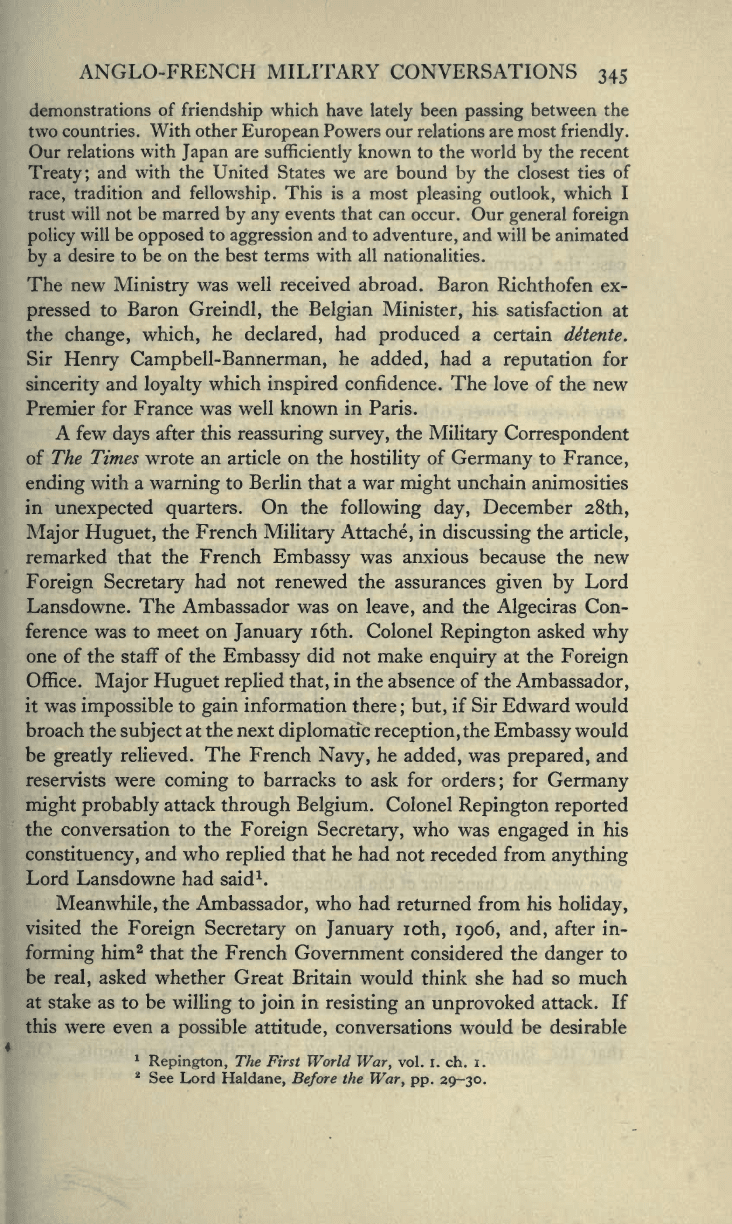
ANGLO-FRENCH MILITARY
CONVERSATIONS
345
demonstrations
of
friendship
which have
lately
been
passing
between the
two
countries.
With
other
European
Powers
our
relations
are
most
friendly.
Our relations
with
Japan
are
sufficiently
known to
the
world
by
the recent
Treaty;
and
with
the United
States we are bound
by
the
closest ties
of
race,
tradition
and
fellowship.
This
is
a
most
pleasing
outlook,
which
I
trust
will
not be marred
by any
events
that
can
occur. Our
general foreign
policy
will be
opposed
to
aggression
and
to
adventure,
and will
be
animated
by
a desire
to
be
on the best terms
with
all
nationalities.
The
new
Ministry
was well received abroad.
Baron
Richthofen ex-
pressed
to
Baron
Greindl,
the
Belgian
Minister,
his
satisfaction
at
the
change,
which,
he
declared,
had
produced
a
certain ditente.
Sir
Henry
Campbell-Bannerman,
he
added,
had a
reputation
for
sincerity
and
loyalty
which
inspired
confidence. The
love
of
the new
Premier
for France was well
known in
Paris.
A
few
days
after this
reassuring survey,
the
Military
Correspondent
of The Times wrote an
article
on
the
hostility
of
Germany
to
France,
ending
with
a
warning
to Berlin that
a war
might
unchain
animosities
in
unexpected
quarters.
On
the
following
day,
December
28th,
Major
Huguet,
the
French
Military
Attache,
in
discussing
the
article,
remarked
that
the
French
Embassy
was
anxious
because
the new
Foreign Secretary
had
not
renewed
the assurances
given by
Lord
Lansdowne.
The Ambassador was on
leave,
and
the
Algeciras
Con-
ference was to meet
on
January
16th. Colonel
Repington
asked
why
one
of
the staff
of
the
Embassy
did
not make
enquiry
at
the
Foreign
Office.
Major
Huguet
replied
that,
in
the absence of the
Ambassador,
it was
impossible
to
gain
information there
;
but,
if Sir Edward
would
broach
the
subject
at the next
diplomatic
reception,
the
Embassy
would
be
greatly
relieved. The
French
Navy,
he
added,
was
prepared,
and
reservists
were
coming
to barracks
to
ask for
orders;
for
Germany
might
probably
attack
through Belgium.
Colonel
Repington reported
the conversation to the
Foreign Secretary,
who was
engaged
in his
constituency,
and who
replied
that
he had
not
receded from
anything
Lord
Lansdowne had said
1
.
Meanwhile,
the
Ambassador,
who had
returned
from
his
holiday,
visited
the
Foreign
Secretary
on
January
10th,
1906,
and,
after
in-
forming
him
2
that the French
Government considered the
danger
to
be
real,
asked
whether
Great Britain
would
think she
had so
much
at stake as
to
be
willing
to
join
in
resisting
an
unprovoked
attack.
If
this
were even a
possible
attitude,
conversations would
be desirable
1
Repington,
The First World
War,
vol.
I.
ch.
i.
2
See
Lord
Haldane,
Before
the
War,
pp. 29-30.
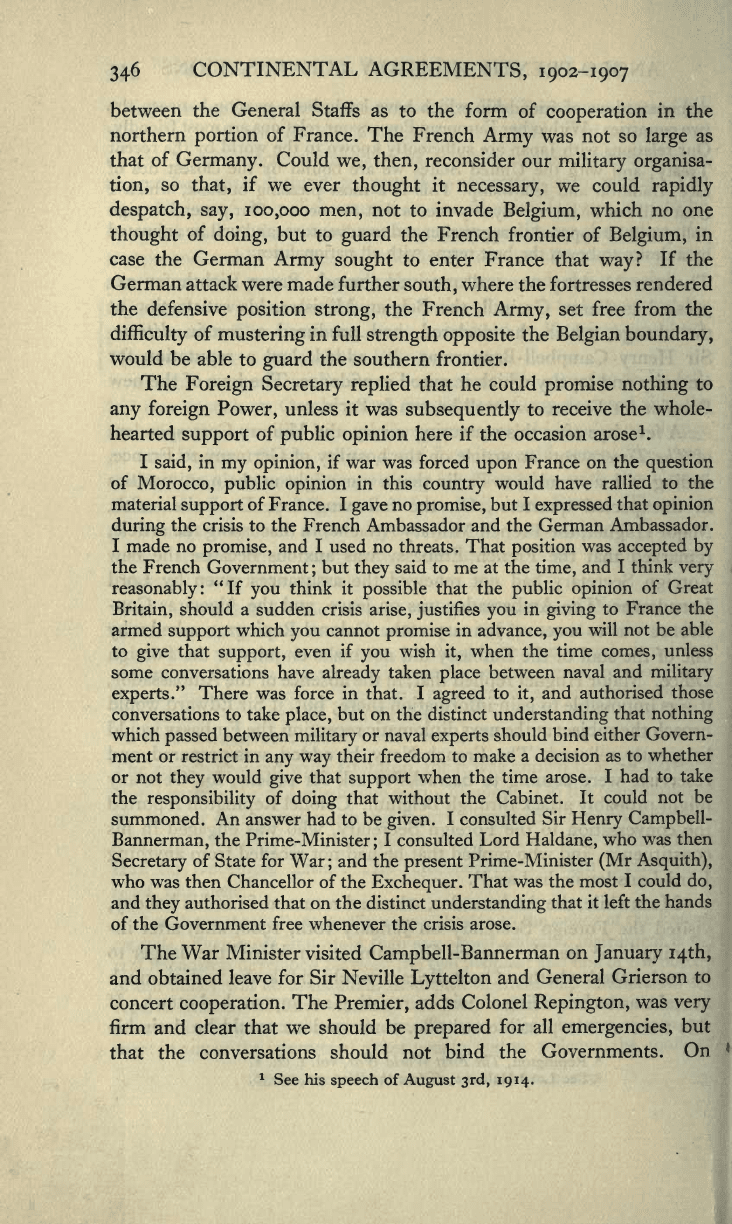
346
CONTINENTAL
AGREEMENTS,
1902-1907
between
the
General
Staffs as
to the form
of
cooperation
in
the
northern
portion
of
France. The
French
Army
was
not
so
large
as
that
of
Germany.
Could
we,
then,
reconsider our
military
organisa-
tion,
so
that,
if
we
ever
thought
it
necessary,
we
could
rapidly
despatch,
say,
100,000
men,
not to
invade
Belgium,
which
no one
thought
of
doing,
but to
guard
the French
frontier of
Belgium,
in
case
the German
Army sought
to
enter
France
that
way?
If
the
German
attack were made
further
south,
where the fortresses
rendered
the
defensive
position strong,
the
French
Army,
set free
from the
difficulty
of
mustering
in full
strength opposite
the
Belgian
boundary,
would
be able
to
guard
the southern
frontier.
The
Foreign Secretary replied
that
he could
promise
nothing
to
any
foreign
Power,
unless
it
was
subsequently
to
receive the
whole-
hearted
support
of
public opinion
here if
the
occasion
arose
1
.
I
said,
in
my opinion,
if war
was forced
upon
France on
the
question
of
Morocco,
public
opinion
in
this
country
would
have
rallied
to the
material
support
of
France.
I
gave
no
promise,
but
I
expressed
that
opinion
during
the
crisis
to
the French Ambassador
and
the German
Ambassador.
I
made no
promise,
and I
used no threats. That
position
was
accepted
by
the French
Government;
but
they
said
to me
at the
time,
and
I think
very
reasonably:
"If
you
think it
possible
that the
public
opinion
of
Great
Britain,
should a sudden
crisis
arise,
justifies
you
in
giving
to France
the
armed
support
which
you
cannot
promise
in
advance,
you
will
not be able
to
give
that
support,
even
if
you
wish
it,
when
the time
comes,
unless
some conversations have
already
taken
place
between
naval
and
military
experts."
There
was force in
that.
I
agreed
to
it,
and
authorised
those
conversations to take
place,
but on the distinct
understanding
that
nothing
which
passed
between
military
or naval
experts
should
bind either
Govern-
ment
or
restrict
in
any way
their freedom
to make
a
decision
as
to whether
or not
they
would
give
that
support
when
the
time
arose.
I had
to
take
the
responsibility
of
doing
that
without the Cabinet.
It could
not be
summoned. An answer had to
be
given.
I
consulted
Sir
Henry
Campbell-
Bannerman,
the
Prime-Minister;
I
consulted
Lord
Haldane,
who
was
then
Secretary
of State for
War;
and the
present
Prime-Minister
(Mr
Asquith),
who was then Chancellor of
the
Exchequer.
That
was the most
I
could
do,
and
they
authorised that on the distinct
understanding
that it left
the
hands
of the Government free
whenever the
crisis
arose.
The
War
Minister
visited
Campbell-
Bannerman
on
January 14th,
and
obtained
leave
for
Sir
Neville
Lyttelton
and General
Grierson
to
concert
cooperation.
The
Premier,
adds
Colonel
Repington,
was
very
firm and clear that we should be
prepared
for all
emergencies,
but
that the conversations
should
not
bind the
Governments.
On
1
See
his
speech
of
August 3rd,
1914.
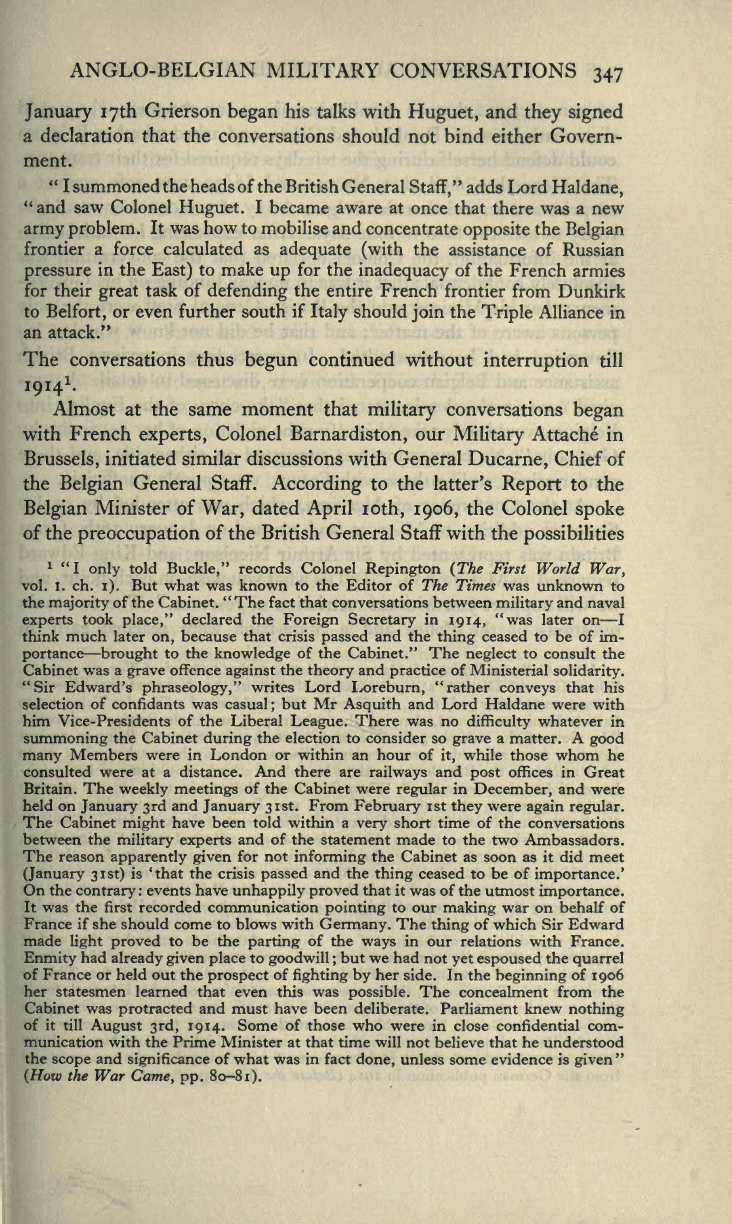
ANGLO-BELGIAN
MILITARY
CONVERSATIONS
347
January
17th
Grierson
began
his
talks
with
Huguet,
and
they
signed
a declaration
that the
conversations
should
not
bind
either
Govern-
ment.
I
summoned
the
heads of
the British
General
Staff,"
adds
Lord
Haldane,
"
and saw Colonel
Huguet.
I
became aware at
once that
there was
a new
army problem.
It was
how
to
mobilise and
concentrate
opposite
the
Belgian
frontier
a
force calculated
as
adequate
(with
the
assistance of
Russian
pressure
in
the
East)
to make
up
for
the
inadequacy
of
the
French armies
for their
great
task
of
defending
the
entire
French
frontier from
Dunkirk
to
Belfort,
or
even
further south
if
Italy
should
join
the
Triple
Alliance
in
an attack."
The
conversations thus
begun
continued
without
interruption
till
1914
1
.
Almost
at
the same moment that
military
conversations
began
with
French
experts,
Colonel
Barnardiston,
our
Military
Attache in
Brussels,
initiated similar discussions with General
Ducarne,
Chief
of
the
Belgian
General Staff.
According
to the latter's
Report
to
the
Belgian
Minister
of
War,
dated
April
10th,
1906,
the Colonel
spoke
of
the
preoccupation
of
the
British General
Staff with the
possibilities
1
"I
only
told
Buckle,"
records Colonel
Repington
(The
First World
War,
vol.
1. ch.
1).
But
what was known to the Editor of The Times was
unknown to
the
majority
of the Cabinet.
"
The fact that conversations
between
military
and naval
experts
took
place,"
declared the
Foreign Secretary
in
1914,
"was
later
on
—
I
think
much later
on,
because that crisis
passed
and
the
thing
ceased
to be of im-
portance
—
brought
to the
knowledge
of the
Cabinet." The
neglect
to
consult
the
Cabinet
was
a
grave
offence
against
the
theory
and
practice
of
Ministerial
solidarity.
"Sir
Edward's
phraseology,"
writes Lord
Loreburn,
"rather
conveys
that his
selection
of
confidants
was
casual;
but Mr
Asquith
and Lord
Haldane were
with
him
Vice-Presidents
of
the Liberal
League.
There was no
difficulty
whatever in
summoning
the
Cabinet
during
the election to consider so
grave
a
matter.
A
good
many
Members were
in
London
or
within an hour of
it,
while
those whom he
consulted
were at
a
distance.
And there are
railways
and
post
offices in
Great
Britain.
The
weekly
meetings
of the
Cabinet were
regular
in
December,
and
were
held
on
January 3rd
and
January
31st.
From
February
1st
they
were
again regular.
The
Cabinet
might
have been told within
a
very
short time
of
the
conversations
between the
military experts
and of
the statement made
to
the
two
Ambassadors.
The reason
apparently given
for not
informing
the
Cabinet as soon as
it
did meet
(January 31st)
is
'that
the
crisis
passed
and the
thing
ceased
to
be
of
importance.'
On
the
contrary
: events have
unhappily proved
that
it was of the
utmost
importance.
It was
the
first recorded
communication
pointing
to
our
making
war on behalf of
France if she
should come to blows with
Germany.
The
thing
of which Sir Edward
made
light
proved
to be the
parting
of the
ways
in
our relations with France.
Enmity
had
already given
place
to
goodwill
;
but
we had
not
yet
espoused
the
quarrel
of
France or held
out the
prospect
of
fighting by
her
side. In the
beginning
of
1906
her
statesmen learned
that even this
was
possible.
The concealment
from the
Cabinet
was
protracted
and
must
have been
deliberate. Parliament
knew
nothing
of
it
till
August 3rd,
1
9
14.
Some
of those who
were in
close confidential
com-
munication with the
Prime Minister at that time will
not believe that
he
understood
the
scope
and
significance
of
what
was
in fact
done,
unless some evidence is
given"
(How
the War
Came,
pp.
80-81).
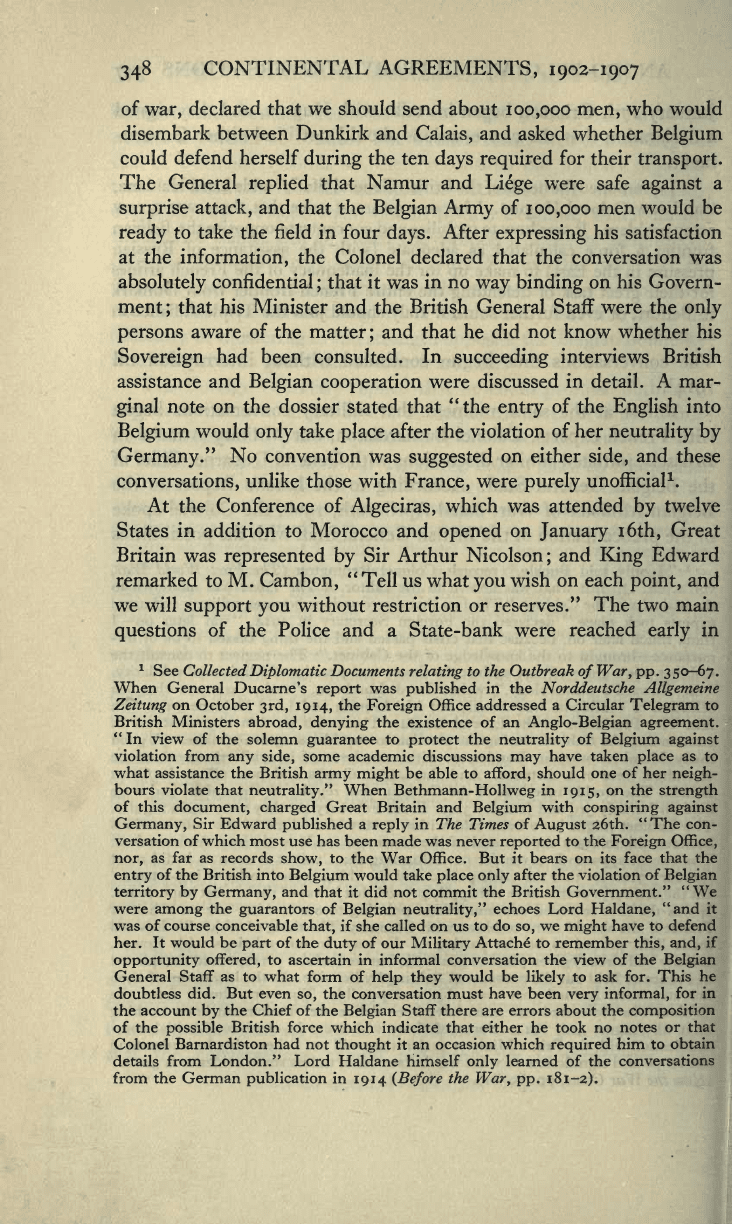
348
CONTINENTAL
AGREEMENTS,
1902-1907
of
war,
declared
that we
should
send
about
100,000
men,
who
would
disembark
between
Dunkirk
and
Calais,
and
asked
whether
Belgium
could defend herself
during
the
ten
days
required
for
their
transport.
The General
replied
that
Namur and
Liege
were safe
against
a
surprise
attack,
and
that the
Belgian Army
of
100,000
men
would be
ready
to
take the field in four
days.
After
expressing
his
satisfaction
at
the
information,
the Colonel declared
that the conversation
was
absolutely
confidential
;
that it
was in
no
way binding
on
his
Govern-
ment
;
that
his
Minister
and
the British
General
Staff
were
the
only
persons
aware of
the
matter
;
and
that
he
did
not
know
whether
his
Sovereign
had
been
consulted.
In
succeeding
interviews British
assistance
and
Belgian cooperation
were
discussed in detail.
A
mar-
ginal
note
on
the dossier
stated that "the
entry
of
the
English
into
Belgium
would
only
take
place
after the violation
of
her
neutrality by
Germany."
No
convention was
suggested
on
either
side,
and
these
conversations,
unlike
those with
France,
were
purely
unofficial
1
.
At the Conference
of
Algeciras,
which was
attended
by
twelve
States
in
addition to Morocco and
opened
on
January
16th,
Great
Britain was
represented
by
Sir
Arthur
Nicolson;
and
King
Edward
remarked
to
M.
Cambon,
"
Tell
us
what
you
wish
on
each
point,
and
we
will
support
you
without restriction
or reserves."
The
two
main
questions
of
the
Police and a
State-bank were
reached
early
in
1
See
Collected
Diplomatic
Documents
relating
to the
Outbreak
of War,
pp.
350-67.
When
General
Ducarne's
report
was
published
in
the
Norddeutsche
Allgemeine
Zeitung
on
October
3rd, 19 14,
the
Foreign
Office addressed
a
Circular
Telegram
to
British Ministers
abroad,
denying
the existence of
an
Anglo-Belgian
agreement.
"
In view of the
solemn
guarantee
to
protect
the
neutrality
of
Belgium against
violation from
any
side,
some academic
discussions
may
have taken
place
as to
what
assistance
the
British
army might
be able to
afford,
should
one of her
neigh-
bours
violate that
neutrality."
When
Bethmann-Hollweg
in
191 5,
on the
strength
of
this
document,
charged
Great
Britain and
Belgium
with
conspiring
against
Germany,
Sir Edward
published
a
reply
in The Times of
August
26th.
"The con-
versation
of which
most use has been made was never
reported
to the
Foreign
Office,
nor,
as far as records
show,
to
the
War Office. But it bears on its
face that the
entry
of
the British into
Belgium
would
take
place
only
after
the
violation
of
Belgian
territory by Germany,
and
that
it
did not commit the British Government."
"We
were
among
the
guarantors
of
Belgian neutrality,"
echoes Lord
Haldane,
"and
it
was of course conceivable
that,
if she called
on
us
to do
so,
we
might
have to
defend
her.
It would
be
part
of the
duty
of
our
Military
Attache
to
remember
this, and,
if
opportunity
offered,
to ascertain in
informal
conversation the view
of
the
Belgian
General Staff
as to
what form of
help they
would
be
likely
to ask
for. This
he
doubtless
did.
But
even
so,
the conversation must
have
been
very
informal,
for in
the account
by
the Chief of
the
Belgian
Staff there
are errors
about the
composition
of the
possible
British force
which
indicate that either he
took
no
notes
or that
Colonel
Barnardiston had
not
thought
it
an occasion
which
required
him to
obtain
details
from London." Lord
Haldane himself
only
learned of the conversations
from
the German
publication
in
19 14
(Before
the
War,
pp.
18
1-2).
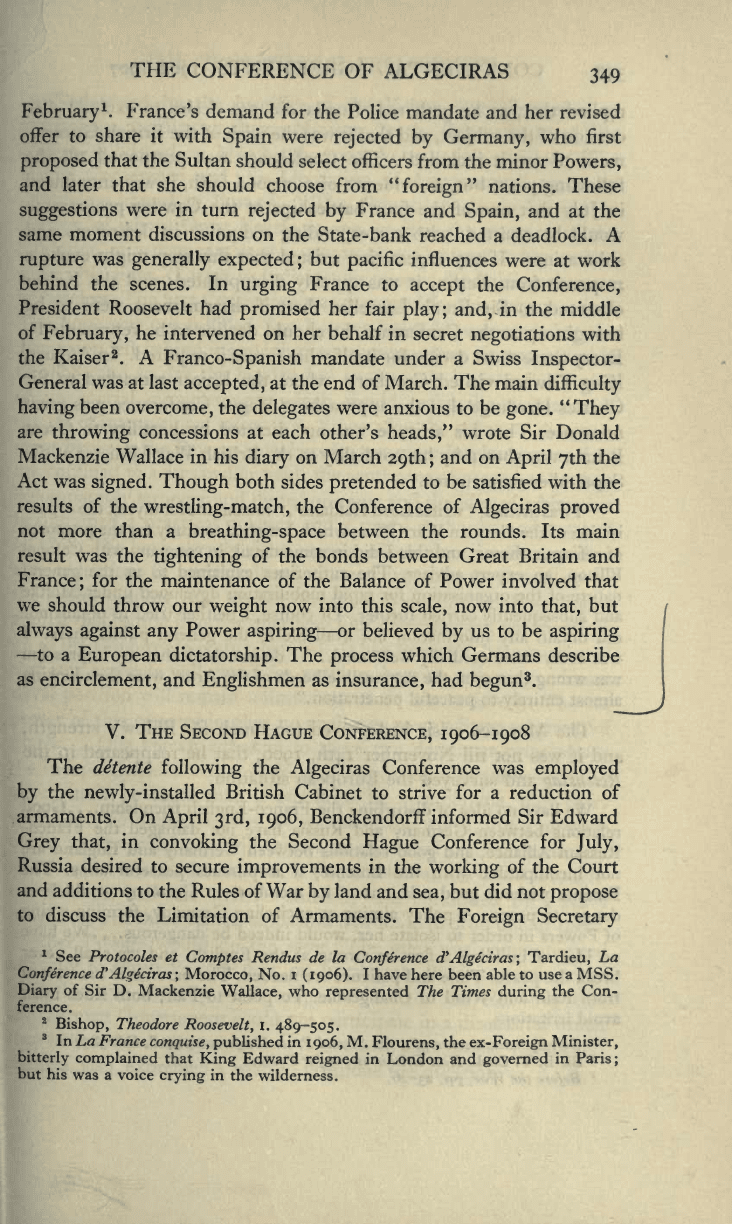
THE
CONFERENCE OF
ALGECIRAS
349
February
1
.
France's
demand for
the
Police
mandate
and her revised
offer to
share
it with
Spain
were
rejected by
Germany,
who
first
proposed
that the
Sultan
should
select officers
from
the minor
Powers,
and
later that she
should
choose from
"foreign"
nations.
These
suggestions
were in
turn
rejected
by
France and
Spain,
and
at the
same
moment
discussions on
the
State-bank
reached a
deadlock.
A
rupture
was
generally
expected
;
but
pacific
influences
were at
work
behind
the scenes.
In
urging
France
to
accept
the
Conference,
President
Roosevelt
had
promised
her fair
play;
and,
in
the middle
of
February,
he
intervened on
her behalf in
secret
negotiations
with
the Kaiser
2
.
A Franco-
Spanish
mandate
under
a
Swiss
Inspector-
General was
at last
accepted,
at the end
of
March.
The main
difficulty
having
been
overcome,
the
delegates
were anxious
to
be
gone.
"They
are
throwing
concessions at each
other's
heads,"
wrote
Sir Donald
Mackenzie
Wallace
in his
diary
on March
29th
;
and
on
April 7th
the
Act
was
signed. Though
both
sides
pretended
to
be
satisfied with the
results
of
the
wrestling-match,
the Conference
of
Algeciras proved
not
more than a
breathing-space
between the rounds. Its main
result
was
the
tightening
of
the
bonds
between Great Britain
and
France
;
for
the maintenance of
the Balance
of
Power involved
that
we should
throw
our
weight
now
into this
scale,
now
into
that,
but
always against
any
Power
aspiring
—
or
believed
by
us
to be
aspiring
—
to a
European
dictatorship.
The
process
which
Germans
describe
as
encirclement,
and
Englishmen
as
insurance,
had
begun
3
.
V. The Second
Hague
Conference,
1906-1908
The detente
following
the
Algeciras
Conference
was
employed
by
the
newly-installed
British
Cabinet to strive
for a
reduction
of
armaments. On
April 3rd,
1906,
Benckendorff
informed
Sir
Edward
Grey
that,
in
convoking
the Second
Hague
Conference
for
July,
Russia
desired
to secure
improvements
in
the
working
of
the
Court
and
additions
to
the Rules of War
by
land
and
sea,
but
did
not
propose
to
discuss
the
Limitation
of
Armaments.
The
Foreign
Secretary
1
See
Protocoles et
Comptes
Rendus de la
Conference
d
y
Algiciras
\
Tardieu,
La
Conference
d'
Algeciras
;
Morocco,
No.
i
(1906).
I
have here been
able to use
a
MSS.
Diary
of
Sir
D.
Mackenzie
Wallace,
who
represented
The Times
during
the Con-
ference.
2
Bishop,
Theodore
Roosevelt,
1.
489-505.
3
In La
France
conquise,
published
in
1906,
M.
Flourens,
the
ex-
Foreign
Minister,
bitterly
complained
that
King
Edward
reigned
in
London
and
governed
in
Paris;
but his
was
a
voice
crying
in the
wilderness.
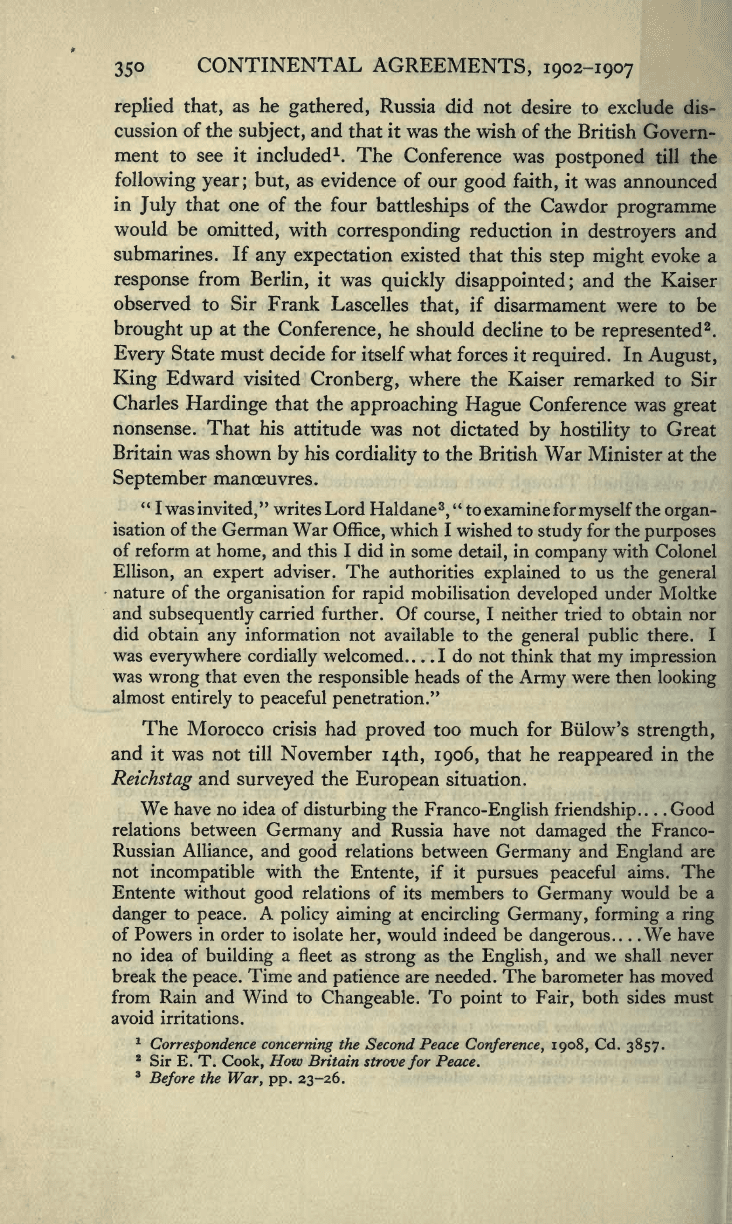
35o
CONTINENTAL
AGREEMENTS,
1902-1907
replied
that,
as
he
gathered,
Russia did
not desire
to exclude dis-
cussion
of
the
subject,
and
that it was
the
wish
of
the
British
Govern-
ment to
see
it
included
1
.
The
Conference was
postponed
till the
following year;
but,
as
evidence of our
good
faith,
it was announced
in
July
that
one of
the four
battleships
of
the
Cawdor
programme
would
be
omitted,
with
corresponding
reduction in
destroyers
and
submarines. If
any expectation
existed
that this
step
might
evoke
a
response
from
Berlin,
it was
quickly
disappointed;
and
the Kaiser
observed
to
Sir
Frank
Lascelles
that,
if
disarmament were
to
be
brought
up
at the
Conference,
he should
decline
to
be
represented
2
.
Every
State must
decide
for
itself
what
forces
it
required.
In
August,
King
Edward
visited
Cronberg,
where the
Kaiser remarked
to
Sir
Charles
Hardinge
that the
approaching Hague
Conference was
great
nonsense.
That
his
attitude was
not dictated
by hostility
to
Great
Britain was shown
by
his
cordiality
to
the
British
War
Minister at the
September
manoeuvres.
"
I
was
invited,"
writes Lord
Haldane
3
,
"
to
examine
for
myself
the
organ-
isation of
the German
War
Office,
which
I
wished to
study
for
the
purposes
of
reform at
home,
and
this
I
did in
some
detail,
in
company
with
Colonel
Ellison,
an
expert
adviser.
The
authorities
explained
to
us
the
general
nature of the
organisation
for
rapid
mobilisation
developed
under Moltke
and
subsequently
carried
further. Of
course,
I
neither tried
to
obtain
nor
did
obtain
any
information
not
available to
the
general
public
there.
I
was
everywhere
cordially
welcomed I
do not think that
my impression
was
wrong
that
even the
responsible
heads
of
the
Army
were
then
looking
almost
entirely
to
peaceful penetration."
The Morocco crisis had
proved
too
much
for Billow's
strength,
and
it
was
not till November
14th,
1906,
that
he
reappeared
in
the
Reichstag
and
surveyed
the
European
situation.
We
have
no
idea
of
disturbing
the
Franco-English friendship
Good
relations between
Germany
and
Russia have
not
damaged
the
Franco-
Russian
Alliance,
and
good
relations
between
Germany
and
England
are
not
incompatible
with
the
Entente,
if it
pursues
peaceful
aims.
The
Entente without
good
relations
of
its members
to
Germany
would be
a
danger
to
peace.
A
policy
aiming
at
encircling
Germany,
forming
a
ring
of Powers in order
to
isolate
her,
would indeed
be
dangerous..
.
.We
have
no
idea
of
building
a
fleet
as
strong
as
the
English,
and we shall
never
break the
peace.
Time and
patience
are needed. The
barometer
has moved
from
Rain
and
Wind to
Changeable.
To
point
to
Fair,
both
sides
must
avoid irritations.
1
Correspondence
concerning
the
Second
Peace
Conference, 1908,
Cd.
3857.
2
Sir
E.
T.
Cook,
How
Britain strove
for
Peace.
3
Before
the
War,
pp. 23-26.
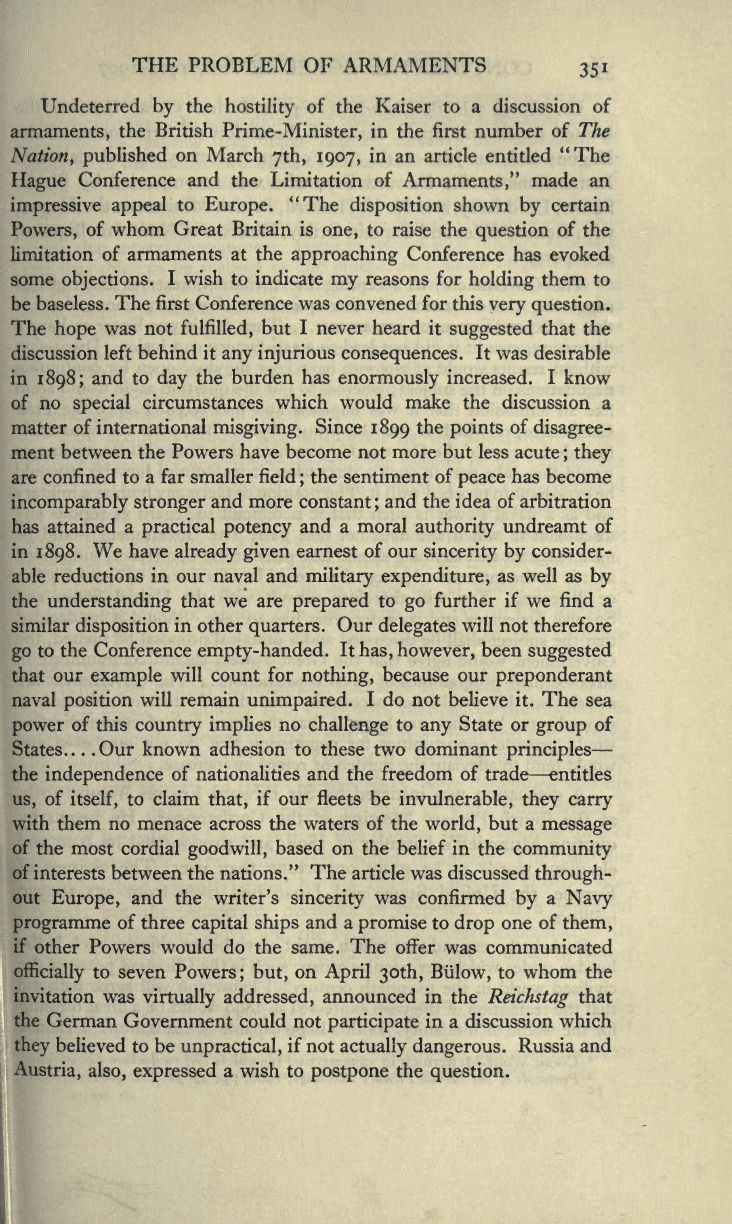
THE PROBLEM
OF ARMAMENTS
351
Undeterred
by
the
hostility
of
the
Kaiser
to
a discussion of
armaments,
the
British
Prime-Minister,
in
the first
number
of The
Nation,
published
on
March
7th,
1907,
in
an
article entitled
"The
Hague
Conference
and
the
Limitation
of
Armaments,"
made an
impressive appeal
to
Europe.
"The
disposition
shown
by
certain
Powers,
of
whom
Great Britain
is
one,
to raise
the
question
of
the
limitation
of armaments at the
approaching
Conference has evoked
some
objections.
I
wish
to
indicate
my
reasons for
holding
them
to
be
baseless. The first
Conference
was
convened for
this
very question.
The
hope
was not
fulfilled,
but
I
never
heard
it
suggested
that
the
discussion left
behind it
any injurious consequences.
It
was
desirable
in
1898;
and to
day
the burden
has
enormously
increased.
I
know
of
no
special
circumstances
which
would
make the discussion
a
matter
of
international
misgiving.
Since
1899
the
points
of
disagree-
ment
between the
Powers have become not more but less
acute
;
they
are
confined to
a far smaller field
;
the sentiment
of
peace
has
become
incomparably stronger
and more constant
;
and the idea
of
arbitration
has attained
a
practical potency
and a moral
authority
undreamt
of
in
1898.
We have
already given
earnest
of our
sincerity by
consider-
able reductions
in our
naval and
military
expenditure,
as
well
as
by
the
understanding
that we
are
prepared
to
go
further
if
we
find
a
similar
disposition
in
other
quarters.
Our
delegates
will not
therefore
go
to the
Conference
empty-handed.
It
has, however,
been
suggested
that
our
example
will
count
for
nothing,
because our
preponderant
naval
position
will
remain
unimpaired.
I
do
not
believe it.
The
sea
power
of
this
country
implies
no
challenge
to
any
State or
group
of
States.
. . . Our known adhesion to these two dominant
principles
—
the
independence
of
nationalities and
the
freedom
of
trade
—
entitles
us,
of
itself,
to
claim
that,
if our
fleets be
invulnerable,
they carry
with them
no
menace across
the waters
of
the
world,
but
a
message
of
the
most
cordial
goodwill,
based
on
the
belief
in
the
community
of
interests between the nations."
The
article
was discussed
through-
out
Europe,
and
the writer's
sincerity
was confirmed
by
a
Navy
programme
of
three
capital
ships
and a
promise
to
drop
one
of
them,
if
other
Powers
would do
the
same. The
offer was communicated
officially
to seven
Powers; but,
on
April
30th,
Biilow,
to
whom
the
invitation was
virtually
addressed,
announced
in
the
Reichstag
that
the
German
Government
could
not
participate
in
a
discussion which
they
believed
to
be
unpractical,
if
not
actually
dangerous.
Russia and
Austria,
also,
expressed
a
wish to
postpone
the
question.
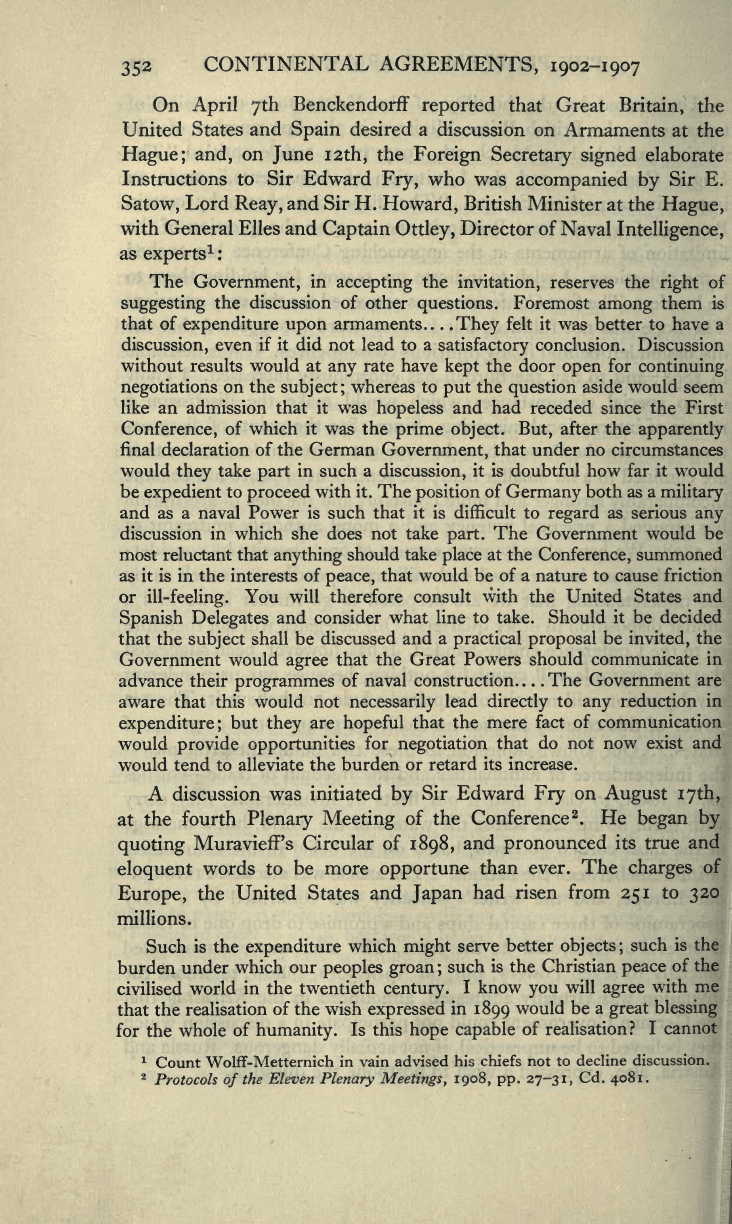
352
CONTINENTAL
AGREEMENTS,
1902-1907
On
April
7th
Benckendorff
reported
that
Great
Britain,
the
United
States
and
Spain
desired
a
discussion on
Armaments
at the
Hague;
and,
on
June
12th,
the
Foreign
Secretary
signed
elaborate
Instructions
to
Sir Edward
Fry,
who was
accompanied
by
Sir E.
Satow,
Lord
Reay,
and
Sir
H.
Howard,
British
Minister at the
Hague,
with
General
Elles
and
Captain
Ottley,
Director
of
Naval
Intelligence,
as
experts
1
:
The
Government,
in
accepting
the
invitation,
reserves the
right
of
suggesting
the discussion
of
other
questions.
Foremost
among
them is
that
of
expenditure upon
armaments.. .
.They
felt it
was better to have a
discussion,
even
if it did
not
lead to a
satisfactory
conclusion. Discussion
without
results
would at
any
rate have
kept
the door
open
for
continuing
negotiations
on the
subject
;
whereas
to
put
the
question
aside would
seem
like
an
admission
that it
was
hopeless
and
had
receded since the
First
Conference,
of
which
it was
the
prime
object.
But,
after the
apparently
final
declaration
of the
German
Government,
that
under
no
circumstances
would
they
take
part
in
such
a
discussion,
it is doubtful how far it would
be
expedient
to
proceed
with
it.
The
position
of
Germany
both as a
military
and
as
a
naval
Power
is
such that
it
is difficult to
regard
as
serious
any
discussion
in which
she
does not take
part.
The Government
would be
most
reluctant
that
anything
should take
place
at the
Conference,
summoned
as it
is
in the interests
of
peace,
that would be of
a
nature to cause friction
or
ill-feeling.
You will therefore
consult with the United States
and
Spanish Delegates
and
consider
what line
to
take.
Should it
be decided
that
the
subject
shall be
discussed and
a
practical proposal
be
invited,
the
Government
would
agree
that the Great Powers should
communicate
in
advance their
programmes
of naval construction.. . .The
Government
are
aware
that this would not
necessarily
lead
directly
to
any
reduction
in
expenditure;
but
they
are
hopeful
that the
mere fact
of
communication
would
provide opportunities
for
negotiation
that
do not now exist
and
would tend
to alleviate
the burden
or
retard
its increase.
A discussion
was initiated
by
Sir Edward
Fry
on
August
17th,
at the fourth
Plenary
Meeting
of
the
Conference
2
. He
began
by
quoting
MuraviefFs
Circular
of
1898,
and
pronounced
its
true
and
eloquent
words to be more
opportune
than
ever. The
charges
of
Europe,
the United States
and
Japan
had risen
from
251
to
320
millions.
Such
is the
expenditure
which
might
serve
better
objects;
such
is
the
burden
under
which our
peoples groan
;
such
is
the
Christian
peace
of
the
civilised
world
in the twentieth
century.
I know
you
will
agree
with
me
that the
realisation
of the
wish
expressed
in
1899
would be
a
great
blessing
for the
whole
of
humanity.
Is
this
hope
capable
of
realisation?
I
cannot
1
Count
Wolff-
Metternich
in
vain
advised
his
chiefs not to
decline
discussion.
2
Protocols
of
the
Eleven
Plenary
Meetings,
1908,
pp.
27-31,
Cd.
4081.
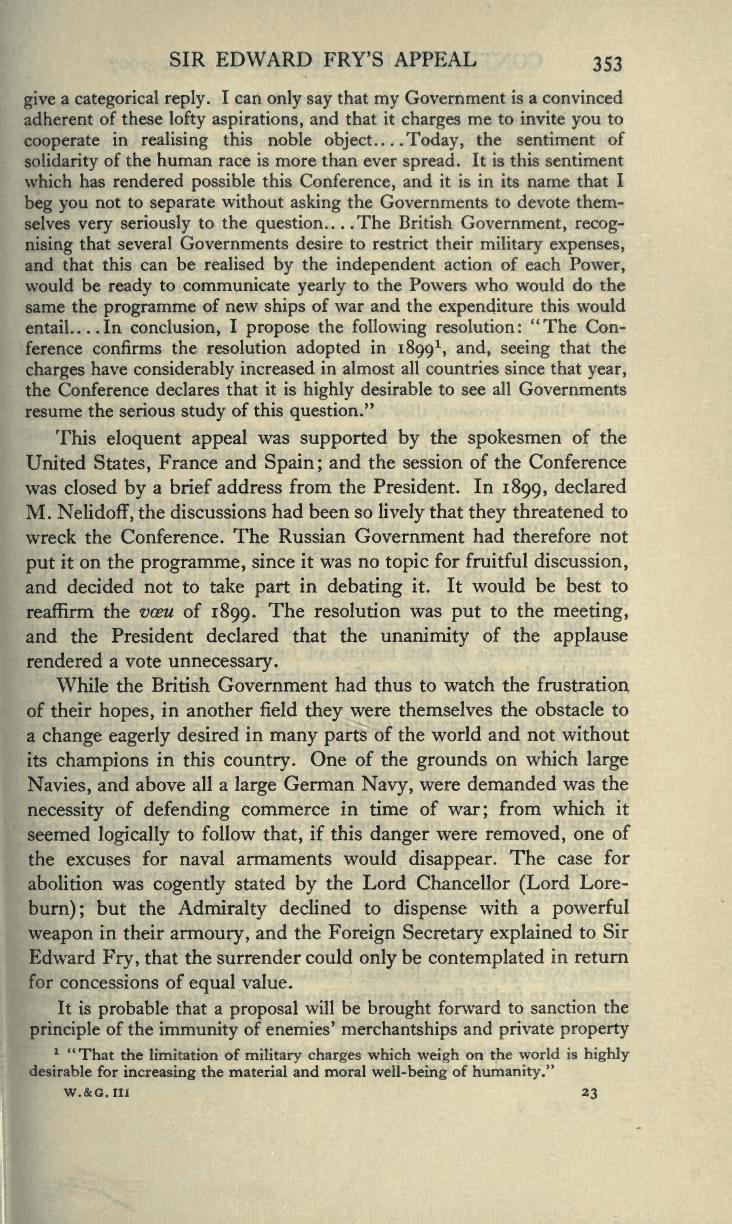
SIR EDWARD
FRY'S
APPEAL
353
give
a
categorical
reply.
I
can
only say
that
my
Government
is
a
convinced
adherent
of these
lofty aspirations,
and that it
charges
me
to invite
you
to
cooperate
in
realising
this
noble
object..
.
.Today,
the sentiment
of
solidarity
of the human race
is more
than
ever
spread.
It is
this
sentiment
which
has rendered
possible
this
Conference,
and
it
is in its name
that
I
beg
you
not to
separate
without
asking
the
Governments
to
devote
them-
selves
very
seriously
to
the
question
The British
Government,
recog-
nising
that
several
Governments desire to
restrict their
military expenses,
and
that this
can be
realised
by
the
independent
action
of
each
Power,
would be
ready
to communicate
yearly
to
the Powers
who
would do the
same
the
programme
of new
ships
of war
and the
expenditure
this
would
entail....
In
conclusion,
I
propose
the
following
resolution:
"The Con-
ference
confirms
the resolution
adopted
in
1899
1
,
and,
seeing
that the
charges
have
considerably
increased
in
almost
all
countries since that
year,
the
Conference
declares
that
it
is
highly
desirable
to
see
all
Governments
resume
the serious
study
of
this
question."
This
eloquent
appeal
was
supported by
the
spokesmen
of
the
United
States,
France
and
Spain;
and the session
of
the Conference
was
closed
by
a brief address
from
the
President.
In
1899,
declared
M.
NelidofT,
the
discussions
had been so
lively
that
they
threatened
to
wreck
the
Conference.
The Russian Government
had
therefore
not
put
it
on
the
programme,
since
it
was
no
topic
for fruitful
discussion,
and decided not
to take
part
in
debating
it. It
would be best to
reaffirm the
voeu
of
1899.
The
resolution
was
put
to the
meeting,
and
the
President
declared that the
unanimity
of
the
applause
rendered
a
vote
unnecessary.
While
the British
Government
had
thus to
watch the frustration
of
their
hopes,
in
another
field
they
were
themselves
the obstacle to
a
change eagerly
desired
in
many
parts
of
the
world
and
not without
its
champions
in this
country.
One
of
the
grounds
on which
large
Navies,
and
above
all a
large
German
Navy,
were demanded
was
the
necessity
of
defending
commerce
in
time
of
war;
from which
it
seemed
logically
to
follow
that,
if
this
danger
were
removed,
one
of
the excuses
for naval armaments
would
disappear.
The case
for
abolition
was
cogently
stated
by
the Lord Chancellor
(Lord
Lore-
burn);
but the
Admiralty
declined to
dispense
with
a
powerful
weapon
in
their
armoury,
and
the
Foreign
Secretary explained
to
Sir
Edward
Fry,
that
the surrender
could
only
be
contemplated
in
return
for
concessions of
equal
value.
It is
probable
that
a
proposal
will be
brought
forward
to sanction
the
principle
of the
immunity
of
enemies'
merchantships
and
private
property
1
"That the limitation of
military
charges
which
weigh
on
the
world
is
highly
desirable
for
increasing
the material
and moral
well-being
of
humanity."
w.&g.iii
23
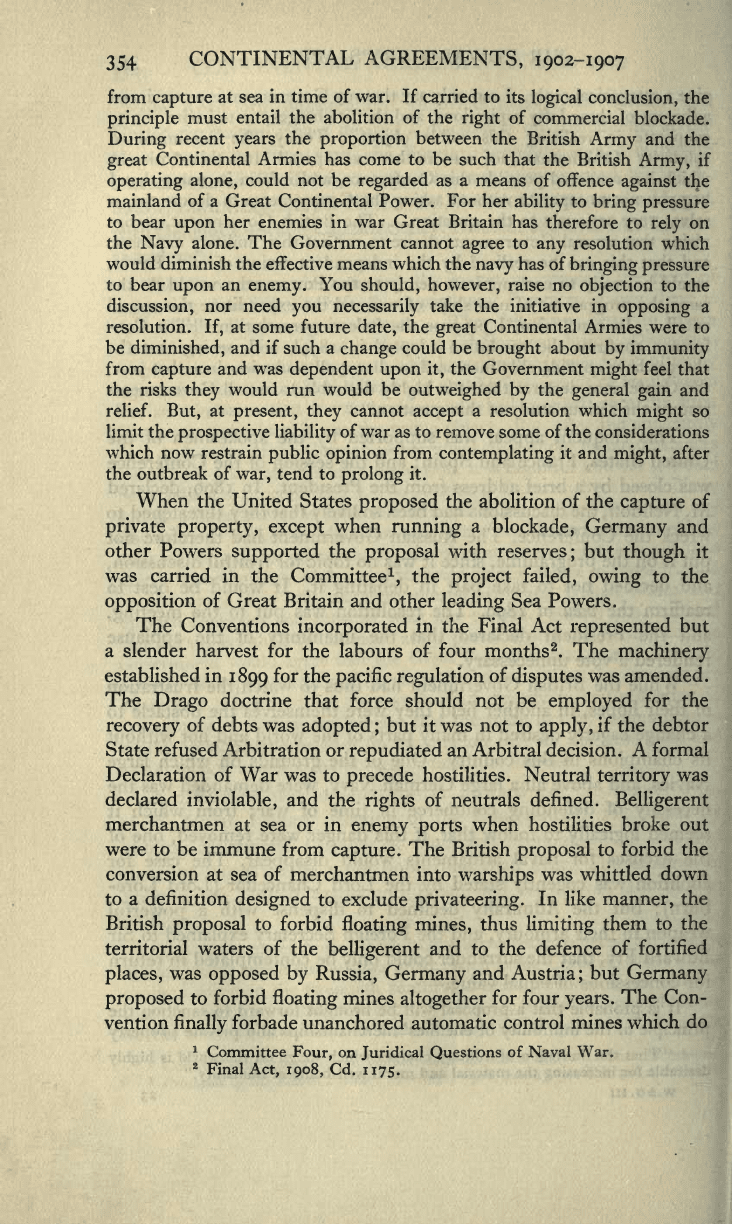
354
CONTINENTAL
AGREEMENTS,
1902-1907
from
capture
at sea
in time of
war.
If
carried to
its
logical
conclusion,
the
principle
must entail
the
abolition
of
the
right
of
commercial
blockade.
During
recent
years
the
proportion
between the
British
Army
and
the
great
Continental Armies
has
come to be such
that
the British
Army,
if
operating
alone,
could
not
be
regarded
as
a
means of
offence
against
the
mainland of a
Great Continental Power.
For
her
ability
to
bring
pressure
to bear
upon
her
enemies
in war Great Britain
has
therefore to
rely
on
the
Navy
alone.
The
Government
cannot
agree
to
any
resolution which
would
diminish the effective means which the
navy
has
of
bringing pressure
to
bear
upon
an
enemy.
You
should, however,
raise no
objection
to
the
discussion,
nor
need
you
necessarily
take the initiative in
opposing
a
resolution.
If,
at
some
future
date,
the
great
Continental
Armies were to
be
diminished,
and if such
a
change
could be
brought
about
by
immunity
from
capture
and
was
dependent
upon
it,
the
Government
might
feel
that
the risks
they
would run would be
outweighed
by
the
general
gain
and
relief.
But,
at
present,
they
cannot
accept
a
resolution which
might
so
limit
the
prospective
liability
of
war
as to
remove some
of the
considerations
which
now
restrain
public opinion
from
contemplating
it and
might,
after
the outbreak
of
war,
tend to
prolong
it.
When the United
States
proposed
the
abolition
of the
capture
of
private
property, except
when
running
a
blockade,
Germany
and
other Powers
supported
the
proposal
with
reserves;
but
though
it
was carried in the
Committee
1
,
the
project
failed,
owing
to
the
opposition
of
Great Britain and other
leading
Sea Powers.
The
Conventions
incorporated
in the Final Act
represented
but
a slender
harvest
for
the labours of four
months
2
. The
machinery
established
in
1899
for
the
pacific
regulation
of
disputes
was
amended.
The
Drago
doctrine
that
force should not be
employed
for the
recovery
of
debts was
adopted
;
but it
was not to
apply,
if
the
debtor
State refused
Arbitration or
repudiated
an
Arbitral
decision.
A formal
Declaration of War
was to
precede
hostilities. Neutral
territory
was
declared
inviolable,
and
the
rights
of
neutrals
defined.
Belligerent
merchantmen at sea or in
enemy
ports
when hostilities
broke
out
were to be immune from
capture.
The British
proposal
to
forbid the
conversion at sea of
merchantmen into
warships
was whittled
down
to
a
definition
designed
to exclude
privateering.
In
like
manner,
the
British
proposal
to forbid
floating
mines,
thus
limiting
them
to the
territorial
waters
of
the
belligerent
and
to
the
defence
of fortified
places,
was
opposed
by
Russia,
Germany
and
Austria;
but
Germany
proposed
to
forbid
floating
mines
altogether
for four
years.
The Con-
vention
finally
forbade
unanchored
automatic
control
mines which
do
1
Committee
Four,
on
Juridical
Questions
of Naval War.
2
Final
Act, 1908,
Cd.
1175.
